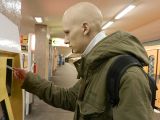(Created page with "In order to the robotic laws of [http://de.wikipedia.org/wiki/Robotergesetze Isaac Asimov] and the [http://de.wikipedia.org/wiki/Turing-Test Turing Test] i will experiment with w...") |
m (→Introduction) |
||
| (15 intermediate revisions by 2 users not shown) | |||
| Line 1: | Line 1: | ||
In order to the robotic laws of [ | ==Introduction== | ||
[[File:a-captcha-pk-2011.jpg|thumb|Type the two words]] | |||
In order to the robotic laws of [[wikipedia:Three Laws of Robotics|Isaac Asimov]] and the [[wikipedia:Turing test|Turing test]] I experiment with ways we could adopt the functions of online captchas into the material world in the near future. | |||
<br clear="all" /> | |||
I | ==Idea== | ||
How can humans express themselves unlike androids? To discover the reaction of humans on robotic existance I create a notional szenario: | |||
Scientists from the Universität der Bundeswehr München designed an android system that is able to distinguish between humans and robots through a simple conversation. They started a field test in public spaces to find bugs that have to be patched and to train social competences of the system. | |||
==Performance== | |||
Dressed like an android I face public spaces sitting with a sign on my lap to get in contact with passers-by. The sign does not tell them why I was invented and what's my main assignment in the future. They have to get this through the conversation to me. To alienate the audience about their imagination of robotic behaviour (slow motion, humdrum voice and so on) and convince them about the progress of cybernetic science I will rarely move my body - but being appealed by the audience I will awake from standby and act completely humanely in every verbal and facial expression. | |||
==Media== | |||
''Documents'' | |||
Sign: [[File:analogue_c_fv.pdf]] | |||
''Gallery'' | |||
<gallery widths="200px" perrow="4"> | |||
File:analogue_c_fv_6.jpg|preparing | |||
File:analogue_c_fv_2.jpg|on the way | |||
File:analogue_c_fv_3.jpg|getting in position | |||
File:analogue_c_fv_5.jpg|getting into contact | |||
</gallery> | |||
''Teaser'' | |||
<videoflash type=vimeo>37663094|530|300</videoflash> | |||
Latest revision as of 22:26, 26 June 2012
Introduction
In order to the robotic laws of Isaac Asimov and the Turing test I experiment with ways we could adopt the functions of online captchas into the material world in the near future.
Idea
How can humans express themselves unlike androids? To discover the reaction of humans on robotic existance I create a notional szenario:
Scientists from the Universität der Bundeswehr München designed an android system that is able to distinguish between humans and robots through a simple conversation. They started a field test in public spaces to find bugs that have to be patched and to train social competences of the system.
Performance
Dressed like an android I face public spaces sitting with a sign on my lap to get in contact with passers-by. The sign does not tell them why I was invented and what's my main assignment in the future. They have to get this through the conversation to me. To alienate the audience about their imagination of robotic behaviour (slow motion, humdrum voice and so on) and convince them about the progress of cybernetic science I will rarely move my body - but being appealed by the audience I will awake from standby and act completely humanely in every verbal and facial expression.
Media
Documents
Sign: File:Analogue c fv.pdf
Gallery
Teaser
<videoflash type=vimeo>37663094|530|300</videoflash>




